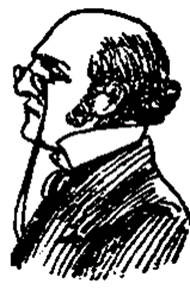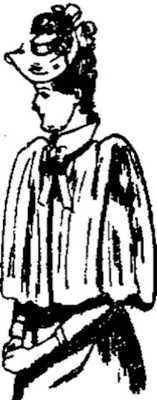This article has been transcribed from a copy of the Cardiff Times in the online collection of scanned Welsh newspapers 1804-1919 in the National Library of Wales, with grateful recognition of the free access accorded to all readers.
Explanatory Notes
It has not been possible (or, perhaps, even desirable) to explain all the verbal play in this article.
'Dr Johnson … once said that the man who would make a pun would pick a pocket': this has long been popularly believed, on no good evidence.
Allusions to works by Tom Hood … 'They went and told the sexton, and the sexton tolled the bell': from 'Faithless Sally Brown' in his Whims and Oddities; In Prose and Verse (1826) and 'And there he lost his second leg in the Forty second Foot', 'Faithless Nelly Gray', in Whims and Oddities.
Douglas Jerrold … 'By gemini I can, sir.': not traced.
H. J. Byron: Henry James Byron, playwright, whose record-breaking runs in the 1890s included Our Boys in the 1870s and Charley's Aunt.
Mr Johnny L. Toole: (1830–1906) popular comic actor.
The Forty Thieves: a 'Pantomime Burlesque' written by Robert Reece, W. S. Gilbert, F. C. Burnand and Henry J. Byron, as a charity benefit, and produced by the Beefsteak Club of London in 1878.
'toujour[s]-pret' (Always ready): Simon Grennan helpfully suggests that this may be meant to be heard as 'to your prayers' ('tou jours pret'), meaning that John is always ready to go ‘to his prayers’ (to have a drink) in the ‘the church with a chimney on’, that is, the pub, rather than going to prayers at church.' —— David Skilton

t is recorded of Dr Johnson that he once said that the man who would make a pun would pick a pocket. I have had this drummed into me on more than one occasion, but I have, up to the present, failed utterly and entirely in my attempts to discover on what grounds the literary giant based his statement. Perhaps he had a friend with an aptitude for both punning and petty larceny. Even in which case he was hardly justified in classing the whole army of punsters as pick-pockets. One swallow does not make a summer, we are told. Why, then, should one felonious word-twister necessarily condemn as dishonest the whole race of punsters? I pause for a reply.
Whatever its merits or demerits, punning has always been in vogue, and some of the smartest and best-known writers have been addicted to it. Tom Hood, than whom no more popular writer exists, not only punned, but made a feature of it in his leading works. Who is there does not know the lines as 'They went and told the sexton, and the sexton tolled the bell,' and the equally witty line, 'And there he lost his second leg in the Forty second Foot.'
It is told of, I think, Douglas Jerrold that he could make a pun upon any subject, and on some one giving him 'the signs of the zodiac' with the intimation that he could not make a pun upon them, Jerrold replied, 'By gemini I can, sir.'

Loves a Really Bad Pun
Equally smart was his reply to another gentleman who thought he had found a subject on which he could not perpetrate a word twisting atrocity. The gentleman said 'The King. Mr Jerrold.' 'The King is no subject, sir,' said Jerrold, and the gentleman was bound to confess that he was correct.
Among modern writers the tendency to make puns is as apparent as were those of the older era. H. J. Byron, one of the best comedy writers of his time, was an inveterate punster, and at times would go as far as to utilise illiteracy and dialectisms for the purpose of his puns. In one of his pieces, in which Mr J. L. Toole scored a big success, he makes the parvenu and his architect discuss the question of planting the edge of an estate with trees. The architect say, 'I think I'd have it fir.' To which the uneducated one replies, 'Why not have 'em planted near?'
It is sometimes difficult to draw the limit between the pun proper and the witty or smart saying that verges on the domain of pundom. For instance the line on the gravestone of a defunct billiard marker which stated that he had gone for a long rest, while of the nature of a pun pure and simple, can hardly be accepted as the actual unadulterated article.

Doesn't like Puns
Of the same calibre was the remark of H. J. Byron during a long wait between the first and second act of a new comedy at a London theatre. The orchestra, after having played a series of selections, ceased to play, and the principal thing heard in front of the house was the sound of a saw behind the scenes. His attention attracted by the sound, a friend said to the author of Our Boys: 'What on earth are they doing, Harry?' 'Cutting out the second act, I should think,' he replied.

Wants the Pun Explaining
Burlesque is, perhaps, the field in which puns of the unadulterated order flourish most freely, and while there are occasionally to be found really good ones in this arena they are for the most part of the most trying and atrocious order. I remember a very smart one in a burlesque of The Forty Thieves[.] One of the characters, referring to the gold found in the cave of the robbers, said, 'I believe they have found it in pints,' whereupon another character remarked, 'I thought gold was usually found in quartz.'
Of the atrocious order of puns I think nothing can beat one I heard in a burlesque the othe[r] day. The principal boy presented to his lady love some jewels, and when she came to overhau [sic] them she ejaculated, 'Oh what lovely sapphires,' whereupon the aforesaid boy remarked aside, 'If you only knew what I have sapphired' for your sake you would look upon my suit with favour.'

Always Making Puns
To return for a moment to the witty things, verging on pure puns it has been reported that Tom Hood, in describing a serious illness to a friend, said that 'he had been so near to Death's door that he had heard the hinges creak.[']
The perpetual punster has a tendency to develop[e] into a nuisance, for he merely makes puns for the sake of the thing, and, occasionally with the set purpose of annoying other people. A smart retort was once made by one of the order. An old gentleman with a horror of puns said to him, 'Do you know Dr Johnson's opinion of a punster, sir?' To which the offending one answered, 'No, sir. Do you know my opinion of Dr Johnson?' There is no doubt much to be said against the habit of punning, but that it requires a quick and clear intelligence to make a good pun there can be no doubt, and that the public enjoy bad puns as well, if not better than good ones, is proved by the ironic applause and laughter they are received with. One of the best puns in which another language was used that I heard was perpetrated during some chaff between a church goer and gentleman given to 'imbibing.' Meeting the bibulous one on Sunday the religious one said, 'Been to church this morning, John?'' 'Yes,' replied John, 'the church with a chimney on.' 'Ah,' said his friend 'with your church, I am sorry to say, it is a sorry to say, it is a case of toujours-pret.
Last modified 27 April 2022